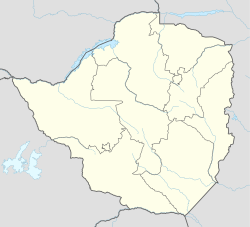This article needs additional citations for verification. (December 2014) |
Chimanimani, originally known as Melsetter, is a town in Zimbabwe.
Chimanimani
Melsetter | |
|---|---|
Town | |
 View of the Chimanimani Mountains as seen from the town | |
| Coordinates: 19°48′00″S 32°51′36″E / 19.80000°S 32.86000°E | |
| Country | Zimbabwe |
| Melsetter | 1892 |
| Chimanimani | 1982 |
| Elevation | 1,470 m (4,820 ft) |
| Population (2012 Census)[1] | |
• Total | 6,815 |
| Time zone | UTC+2 (CAT) |
| Climate | Cwb |
| Website | Homepage |
| Dialling code: 26 (026 from within Zimbabwe) | |
Location
editThis section needs additional citations for verification. (August 2023) |
Chimanimani is a village located in Manicaland Province, in south-eastern Zimbabwe, close to the border with Mozambique. The village lies about 120 kilometres (75 mi), by road, south of Mutare, the location of the provincial headquarters.[2] Its location lies approximately 365 kilometres (227 mi), by road, southeast of Harare, the capital of Zimbabwe and the largest city in that country.[3] The coordinates of the village of Chimanimani are: 19° 48' 0.00"S, 32° 51' 36.00"E (Latitude:19.8000; Longitude:32.8600).
Main Sights: Chimanimani has various nature-based attractions for visitors, most notably Bridal Veil Falls. The Bridal Veil picnic and camping site is located in a small national park about a 5 km (3.1 mi) walk, or a short drive, from the village. The falls itself plunges 50 m (160 ft) down a sheer rock face into a crystal clear pool. Close to the town are the Arboretum, Green Mount, and Pork Pie sanctuary.
The Chimanimani Mountains are a short 18 km (11 mi) drive from the village. There are numerous hiking trails throughout the rugged Chimanimani range. Local guides are available. For adventure activities there is an Outward Bound centre nearby. It offers a range of activities and life-skill programs, accommodation and camping facilities, and access to the Paradise Pool. Other attractions in the Chimanimani Mountain range include the Nyakwaha and Haroni Botanical Reserves, as well as the Haroni and Mukurupiri waterfalls.
Climate
editChimanimani receives rainfall throughout the year. The average temperature is about 16 °C (61 °F).[4]
Economy
editThe local economy of Chimanimani is primarily based on agriculture, with crops such as maize, beans, and vegetables being grown. Livestock farming is also common in the area.[5]
History
editChimanimani was founded by the brothers Thomas Moodie and Dunbar Moodie in 1892. In 1895 it was moved to its current site and was officially called Melsetter after Moodie's family home in Orkney in Scotland. Following Zimbabwe's independence in 1980, the name of the town was changed to Mandidzudzure, in 1982. However, after consultation with the population, the name was changed to Chimanimani.
The city was badly hit by Cyclone Idai in 2019, and was cut off from the regional capital due to damage to roads.[6] The primary school in Chikukwa was destroyed.[7]
Notable people from Chimanimani
editPopulation
editThe 1982 national census estimated the population of the town at 1,370. In 2004, the population of Chimanimani was estimated at 2,752.[8] The next national population census in Zimbabwe is scheduled from 18 August 2012 through 28 August 2012.[9] Most of the inhabitants of Chimanimani are of Ndau origin.
See also
editReferences
edit- ^ Zimbabwe National Statistics Agency. "2012 Census Provincial Report: Manicaland". Archived from the original on 19 May 2018. Retrieved 25 May 2018.
- ^ Road Distance Between Mutare And Chimanimani With Map
- ^ Map Showing Harare And Chimanimani With Distance Marker
- ^ "Climate: Chimanimani – Climate graph, Temperature graph, Climate table – Climate-Data.org". en.climate-data.org. Retrieved 16 January 2016.
- ^ "Chimanimani Biosphere Reserve, Zimbabwe". UNESCO. 21 October 2022. Retrieved 19 October 2023.
- ^ "Tropical Cyclone Idai may have killed more than 1,000 in Mozambique". The Economist. 19 March 2019. ISSN 0013-0613. Retrieved 19 March 2019.
- ^ Zinyuke, Rumbidzayi (21 November 2020). "Zimpapers hailed for heeding President's call". The Herald. Harare, Zimbabwe. Archived from the original on 21 November 2020.
- ^ Estimated Population In 2004[permanent dead link]
- ^ Next Population Census In Zimbabwe Scheduled For August 2012
